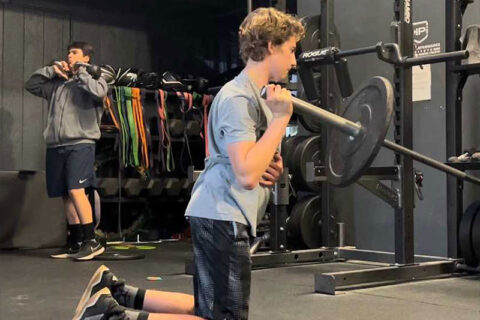The Team Trap
First and foremost, this post is not bashing teams. Almost all of our athletes play on different teams and we have over 20 different travel/club organizations and 30 different high schools represented by the athletes at KPI. What this post is doing is exposing the mindset that can make teams detrimental and hurt player development.
The team part of player development can and should be an integral part of the process with the right mindset and a player-centered approach. But all too often the team’s environment is of detriment to a player and can damage their path and development. There are lots of culprits when this happens, but it most often involves egos and a possessive mindset. This post is going to focus on what is the Team Trap and the mindset families and players should invest in if they are going to reach their true potential.
The Team Trap can present itself in many different ways, some of the main points are below…
The Win Now Mentality
We have been coaching for nearly 20 years and have placed hundreds of players to the upper levels of the game. In all those years and with all those players, not one college recruiter or pro scout has asked “What’s your record” or “What level was the player when they were 14.” The reason why they don’t ask that is that no one actually cares. At the high school level and beyond, coaches/scouts/recruiters only care about how good you are… that’s it. It’s not politics, it’s not social forces… it’s only about… are you good enough? But so many players and families get caught up in which team wins the most at the youth ages. Winning is fun and we all strive to win, but it has very little to do with the development, recruiting, and placement process at older ages. Players and parents should immerse themselves at the younger ages in a program that values development and can provide objective feedback to prove development in a comprehensive system that prioritizes the scalable tools in the game.
Social Forces
This is a part of the Team Trap that many often dismiss, but is a very powerful force. There are a couple of different facets of the Social Force trap… friendships and perception. At the younger ages of the process, parents usually form close friendships with other parents and the family feel we love about teams is presented. But oftentimes players and parents can sometimes outgrow that situation and/or they find a better developmental option and they want to leave the team. But instead of doing what they know is right for their player’s development, they stay with the team so they don’t upset their friends and social status. They get pinned down on the possible broken relationships that might be a consequence of leaving the team. The simple response to this is… is someone your friend if they break a friendship because you are doing what is right for your son or daughter? The other side of the Social Forces trap is social perception. People want to be with the “winning team” and have the perception that they are above everyone else. This is part of the short-term mindset we rail against. Having this mindset can lead to forgetting about development and getting too comfortable with things that are not a part of the development process. Often times the teams that win a lot at the younger ages were put together by the most aggressive coaches that are in it for their own ego (see below) and those that do the right things do not win as much, but they have the most fruitful success in the long run.
Playing Over Training
Another Team Trap is valuing playing overtraining. Playing the sport is of course a crucial part of the developmental process. But what happens too often in baseball or softball is that a player chases around a crazy competitive schedule and does not do the physical and skill work to enhance their development and/or keep them healthy. So they follow around all these tournaments and games, but forget about what can often be the most important… the development of strength, movement, and skill. This situation can often get exaggerated at the high school level with the presence of showcases and aggressive club ball schedules. Players often spend their offseason traveling from event to event with little time for recovery, let alone valuable training to enhance their strength and skills. They get worn down either feeling the need to play as many games as possible or feel the pressure to attend as many events as possible to get “exposure” for recruiting purposes. This often leads to many players losing out on what they need the most… more development. The player that committed to a D1 at a young age needs to continue to develop to keep that commitment long term and/or to have an impact once they get to the campus. The player that is trying to get committed usually needs to enhance their physical tools to get colleges to notice them, but they can’t get that by going on a tour of events and not prioritizing the true development that takes place in the right training setting.
The Possessive Coach
This is one of the most common and detrimental traps players fall into at many levels of the game. This is the team coach that feels he/she is right about all things and that his/her players are their possession. This gets real dangerous real quick. These coaches are in it for the wrong reasons (not player development) and their ego processes each player as a possession that helps them get to their end game (usually wins that feed the ego). This situation plays itself out over and over to increasingly deficient results in the modern era of informed players and families. But the possessive coach still yields a lot of power and can really stand in the way of player development. Players and parents feel handcuffed by possessive coaches since that coach controls playing time and often time the recruiting process. So the player and parents want to make that coach happy and they ignore what they know is right. The reality is that a player is not a possession and he/she only belongs to one thing… his/her family. The true possession of this process belongs to the player and he/she should follow what they know is right for their long-term success and development.
No matter if the player is a potential high draft pick, an early Division 1 commit, or a player that has to fight to make their high school team… development is king. Every part of every player’s process is easier and better if they have advanced physical tools and skills. While on paper this is a simple logic for many of us, at the moment the Team Trap can skew the thoughts of many players and families and has ruined the chances of many of those potential prospects. The players that can balance their competitive and training schedules are the ones that enjoy the best of both worlds and that balance is usually key in the developmental process. There is a great harmony to be had between players, parents, coaches, and trainers and we all just need to continue to work together to find it and do what is best for each player.


